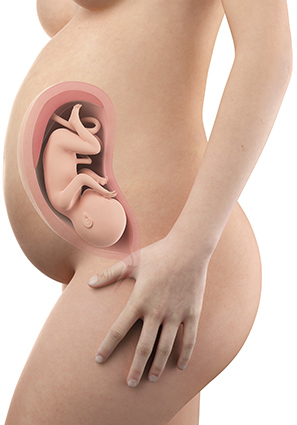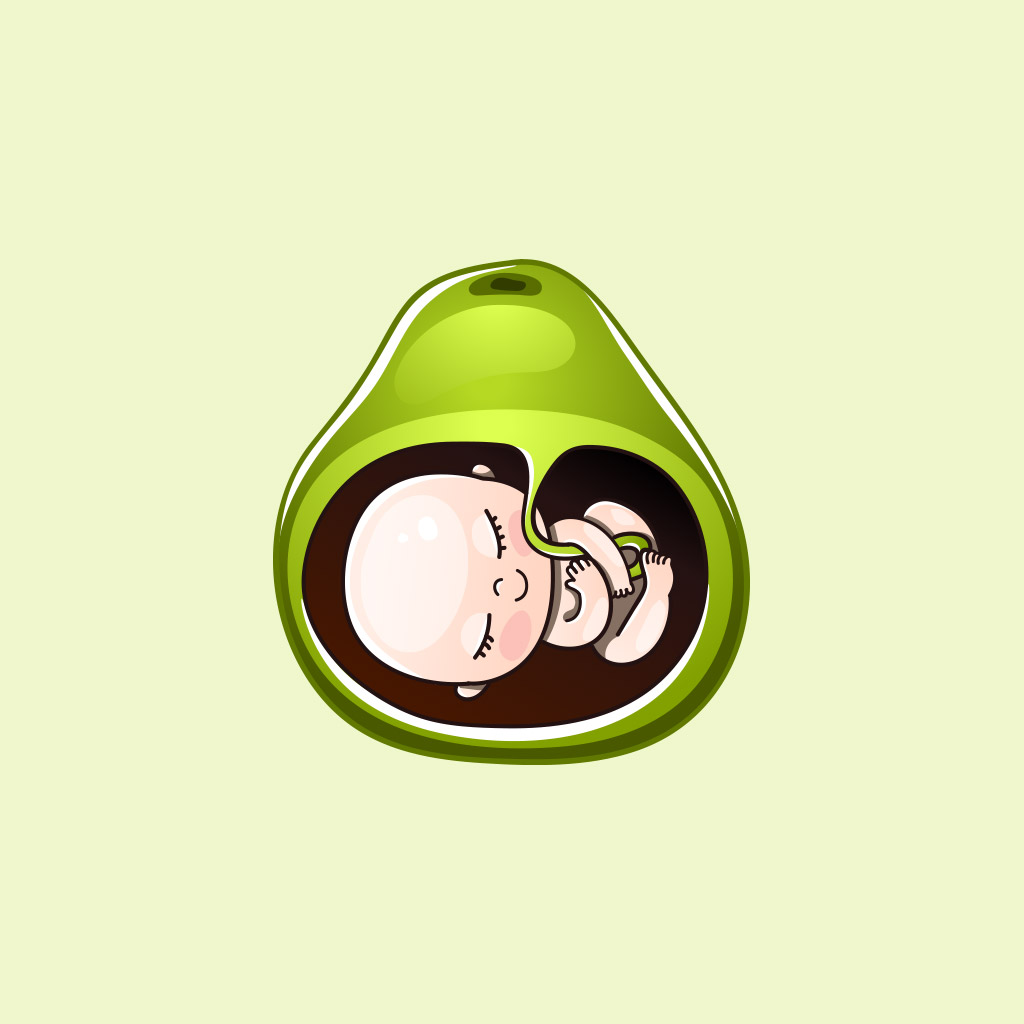Welcome to Week 30 of your pregnancy! You’re now in the final stretch, with about 10 weeks to go before you meet your little one. Your baby is growing rapidly, and you might notice new changes in your body and daily routine. This week is all about preparation, self-care, and tuning in to your baby’s movements.
By Week 30, your baby is about the size of a large cabbage and weighs around 3 pounds. Their brain is expanding, and their eyes can open and close. You might even notice your baby getting active at certain times—wriggling, stretching, and hiccupping as they test out those developing muscles!

As for you, it’s common to feel a blend of excitement and tiredness. A growing belly, shifting center of gravity, and the extra weight may make it harder to move around or get comfortable at night. Some moms notice swelling in their feet and ankles, while others might have heartburn or shortness of breath. These symptoms are normal, but if anything feels out of the ordinary, always reach out to your healthcare provider.
Now is a great time to start thinking about the weeks ahead.
If you haven’t already, you might want to:
- Pack a hospital bag with essentials for you and your baby.
- Discuss your birth plan and preferences with your care team.
- Take a childbirth or breastfeeding class, especially if this is your first baby.
- Check in with your support system so you feel prepared and confident for labor and beyond.
Don’t forget to care for yourself emotionally and physically—asking for help, taking naps when you can, and eating nourishing meals all make a difference. Remember, every pregnancy is unique, and it’s okay if things aren’t going exactly as planned. Trust your instincts and enjoy these final weeks of anticipation. You’re doing wonderfully, and you’re not alone on this journey!
Your Baby’s Development This Week
At 30 weeks, your baby is working hard to get ready for their big debut! By now, your little one is close to as long as a large cabbage, stretching about 16 inches from head to heel. They’re also tipping the scales at nearly 3 pounds, gaining weight quickly as fat builds up under their skin. This extra padding helps regulate body temperature when they’re born and gives their cheeks that adorable round look.
Inside, your baby is growing more “baby-like” each day. If you could peek inside, you’d see tiny, fully formed hands and feet—and those little hands can now hold tightly onto things, sometimes grabbing their own foot or even the umbilical cord. Fingernails are growing longer, and your baby may soon need their first little “manicure” after birth!
This week is also special because your baby’s eyes are open when they’re awake. Not only can they blink, but they’re also learning to focus and might even react to bright lights shining on your belly—for example, they may turn their head away or toward a flashlight. Pigment is developing in their irises, though their permanent eye color will often change after birth.
Another big change is happening beneath the surface. The soft, fine hair known as lanugo, which has covered your baby’s body for warmth, is starting to fall away as they grow more fat. Some babies are born with a little lanugo still present, but most will have lost much of it before delivery. Meanwhile, your baby’s head may already have a good amount of real hair, and the color and texture could surprise you at birth!
Your baby’s internal systems are maturing, too. One important milestone this week is that their bone marrow has taken over making red blood cells—an essential step toward independent life after delivery. Their nervous system is getting more advanced, helping them coordinate more complex movements. That’s why you may notice stronger, more targeted kicks or even rhythmic stretches that could be your baby having the occasional hiccup.
Lung development is still ongoing, and while your baby is practicing tiny “breaths,” the lungs aren’t quite ready for the outside world yet. If your baby were born this week, they’d likely need some extra support to help them breathe. Every extra day in your tummy helps those lungs and other organs finish maturing.
- Movement: Expect to feel your baby moving every day now. These movements may feel less fluttery and more like rolls, swishes, and firm nudges, since your baby has less room to move around.
- Listening Ear: Your baby is tuning in to the sounds outside your belly. They can hear your voice, heartbeat, and even familiar songs or lullabies, which may soothe them after birth!
- Sleep Patterns: Babies at this stage of pregnancy start developing sleep-and-wake cycles. Sometimes their most active moments may be when you’re relaxing or lying down.
This is a wonderful time to talk, sing, or read to your baby—they’re learning to recognize your voice and those comforting rhythms. Every day, your baby is growing stronger and getting ready for life in your arms. Keep taking good care of yourself, and trust that your baby is doing amazing things inside you!
Changes in the Mother’s Body
Reaching 30 weeks is a huge milestone in your pregnancy journey – you’re well into your third trimester, and your body is truly working overtime to help your baby grow strong and healthy. Many moms notice that this stage brings a mix of physical changes, quirky new symptoms, and sometimes some emotional ups and downs. Knowing what to expect can help you feel more confident and prepared as you move closer to meeting your little one.
Here are some of the changes you might notice in your body this week:
- Growing Belly and Changing Posture: Your belly is more prominent now, which can shift your center of gravity and cause you to lean backward a bit. You might notice your back feels sore or tired, and your posture changes as you compensate for the extra weight in front. Gentle stretches, regular movement, and supportive shoes can all help ease discomfort.
- Breathlessness: Many women start to feel short of breath around this time. Your growing uterus is pressing up toward your ribs, making your lungs feel more crowded. Taking things slow and resting when you need to is perfectly normal. Once your baby “drops” lower into your pelvis in the coming weeks, breathing often gets a little easier again.
- Leaking Colostrum: Your breasts are getting ready for nursing, and you may notice a few drops of thick, yellowish fluid on your bra or clothing. This is called colostrum – your baby’s first food! It’s nothing to worry about, but wearing soft breast pads can help if the leaking bothers you.
- More Noticeable Baby Movements: As your little one gets bigger and stronger, kicks, stretches, and wriggles can feel more intense – and sometimes more visible from the outside! Plenty of movement is a wonderful sign that your baby is doing well.
- Swelling: Mild swelling in your feet, ankles, and hands is common now. Warm weather, standing for long periods, or being on your feet a lot can make swelling worse. Try putting your feet up when you relax, drinking enough water, and moving regularly to help your circulation. If swelling becomes sudden, severe, or affects your face, let your doctor know.
- Bathroom Breaks: Your baby is taking up more space in your pelvis and can put more pressure on your bladder, so needing to pee more frequently is very normal. Going to the bathroom often, even at night, is part of this stage – but if you ever feel a burning sensation, talk to your healthcare provider to rule out a urinary infection.
- Itchy Skin and Stretch Marks: As your skin stretches, especially around your belly and breasts, it’s normal for it to feel itchy. Gentle moisturizing creams or oils can give some relief. If you notice a rash or severe itching, check in with your doctor to make sure it’s not something that needs treatment.
- Emotional Swings and Nesting Urges: Hormonal changes can make emotions run high, and it’s common to feel everything from excitement to worry. You might also notice a burst of energy and a sudden urge to organize, clean, or prepare your home for your baby—this is known as “nesting.” It’s perfectly natural – just remember to listen to your body and take breaks when you need to.
It’s important to remember that every mom’s experience at 30 weeks is unique. Some days you may feel full of energy, while others leave you tired or uncomfortable—and that’s all part of preparing for your baby’s arrival. Don’t hesitate to reach out to your doctor or midwife if you have any questions or concerns; you’re never alone on this journey!
What to Expect at Your 30-Week Pregnancy Checkup
By Week 30, your prenatal visits might feel familiar, but each appointment plays an important role for both you and your baby’s ongoing health. These routine checkups are a chance for your healthcare provider to make sure everything is on track and to catch any potential concerns early. Here’s what you can expect during your visit:
- Measuring Your Baby’s Growth: Your doctor or midwife will measure your belly (from your pubic bone to the top of your uterus). This helps track your baby’s growth and development, and makes sure they’re getting the nutrients they need.
- Checking Your Blood Pressure: High blood pressure can be a warning sign of pregnancy complications, such as preeclampsia. Your provider will keep a close eye on your readings to catch any changes early.
- Monitoring for Signs of Swelling or Protein: During most visits, you’ll be asked for a urine sample. This helps check for protein, which can signal issues with kidney function or blood pressure, and helps your care team spot problems before they start.
- Weight Monitoring: Steady, healthy weight gain supports your growing baby. Your healthcare team will check your weight gain and talk to you if there are any concerns—no need to stress about numbers, everyone’s path is a little different.
- Listening to Your Baby’s Heartbeat: One of the best moments each visit! Your provider uses a special tool (like a Doppler) to hear your baby’s heartbeat, a comforting sign that things are moving along smoothly.
- Talking About Baby’s Movements: This is the time to share any changes you’ve noticed with your baby’s kicks, rolls, or wiggles. Some doctors may ask you to keep track of “kick counts” at home—feeling regular movement is a great sign of a healthy baby.
- Discussing Symptoms and Questions: Don’t be shy! If you’re concerned about swelling, headaches, unusual pain, or just have a question, your care team is there to help. Bring up anything that’s on your mind, from trouble sleeping to plans for your birth.
- Extra Screening if Needed: If you’ve had any earlier test results that were out of the ordinary, or if you’re carrying multiples, your provider might order an extra ultrasound or blood test. These help make sure you and your baby are both thriving.
Every pregnancy is unique. Your medical team is your biggest supporter. These checkups are here to keep you and your baby healthy while providing peace of mind in the home stretch. If something feels off or you’re worried between appointments, it’s always okay to reach out—you’re never bothering anyone by protecting your well-being!
Nutritional Tips and Physical Exercise
At 30 weeks, your body is working hard every day to nourish your growing baby. Now is a great time to focus on habits that support both you and your little one as you head into your final stretch of pregnancy. Here are some practical tips to help you feel your best:
- Eat Little and Often: As your baby grows, you may feel full more quickly. Eating smaller amounts more frequently can help ease discomfort and keep your energy steady throughout the day.
- Pile on the Color: Try to add a range of colorful fruits and vegetables to your meals. Foods like spinach, carrots, sweet potatoes, bell peppers, and berries provide important nutrients for your baby’s growth and your own wellness.
- Snack Smart: Instead of chips or candies, opt for snacks that give you lasting energy and nutrients. A handful of unsalted nuts, plain yogurt with fruit, or whole grain crackers with cheese are satisfying options.
- Keep Up with Fibre: Many moms-to-be experience constipation. Including high-fiber foods like whole grains, beans, broccoli, and pears can help keep things moving smoothly.
- Don’t Forget Healthy Fats: Foods like avocado, walnuts, and olive oil are packed with heart-healthy fats. These also support your baby’s developing brain and eyes.
Along with eating well, gentle physical activity can make a real difference in how you feel. Even if you’re feeling tired or heavy, movement can actually boost your energy, help you sleep better, and ease common aches.
- Try Walking: A daily stroll, even for 15-20 minutes, can help reduce swelling, improve mood, and gently prepare your body for labor. Choose comfortable shoes and pick a route you enjoy.
- Stretch it Out: Simple stretching routines, especially for your back, calves, and hips, can relieve tension brought on by carrying extra weight.
- Prenatal Yoga or Swimming: Many find these classes relaxing and safe. They can improve flexibility, ease joint pain, and give you a chance to connect with other moms-to-be.
- Stay Hydrated During Exercise: Drink water before, during, and after any activity. It’ll help keep you comfortable and avoid overheating.
- Listen to Your Body: It’s normal to feel more tired some days. Rest when you need to. If you ever feel dizzy, very short of breath, or have pain while exercising, pause and check in with your provider.
Remember, every pregnancy is different. Some days you may feel ready to be active, and other days you might need extra rest—that’s okay! Taking care of yourself with nourishing food and gentle activity is one of the best ways to support your baby over these next important weeks.
Weekly Checklist
Week 30 is an exciting milestone—your baby is getting bigger, and you may be feeling lots of changes! Here are some helpful things to focus on this week to keep you and your baby healthy, comfortable, and prepared for what’s ahead:
- Track Baby’s Movements: Choose a time each day to count your baby’s kicks, wiggles, and rolls. Most doctors recommend making sure you feel at least 10 movements within two hours, but many babies move much more often. If you notice a significant decrease, call your provider.
- Plan for Maternity Leave: Take some time to review your work’s maternity leave policy if you haven’t already. Start thinking about when you’d like to start your leave and gather any forms that need to be filled out.
- Finish Baby Gear Shopping: Double-check your shopping list. Essentials at this stage include the car seat (install it early!), a safe sleeping space, and newborn clothes. If friends or family ask how they can help, share what you still need.
- Practice Relaxation: Try out calming techniques like deep breathing, gentle stretching, or prenatal yoga. These can help ease aches, improve sleep, and prepare your mind and body for delivery.
- Stock Up on Healthy Snacks: Keep easy-to-grab snacks like fruit, yogurt, and whole-grain crackers handy. Eating small, frequent meals can help manage heartburn and keep your energy up throughout the day.
- Monitor Swelling: Mild swelling in the feet and ankles is common, but if you suddenly notice swelling in your face or hands, or if swelling is severe, contact your healthcare provider. Rest with your feet up when you can.
- Plan Prenatal Visits: Your appointments will likely become more frequent soon. Add them to your calendar, and jot down any questions or symptoms you want to discuss at your next visit.
- Talk with Your Birth Partner: Share your hopes and any concerns about labor and delivery. It can help you both feel more ready for the big day, and it’s a good time to discuss who you’d like in the delivery room.
- Begin Thinking About Pediatricians: If you haven’t chosen one, ask for recommendations and start reaching out to local pediatricians to schedule meet-and-greets or get a sense of their practice.
- Listen to Your Body: Rest when you need to and ask for help with heavy lifting or chores. It’s okay to slow down—you are doing an incredible job growing your baby.
Every week brings something new! Celebrate how far you’ve come, and remember: your well-being is as important as your baby’s. You’re already a wonderful mom, and you’re doing great.
When to Call Your Provider
Your well-being and your baby’s safety are very important, so never hesitate to reach out if something doesn’t feel quite right. While some discomfort is normal at 30 weeks, certain changes deserve attention from your healthcare provider. Knowing the warning signs can give you peace of mind and help catch problems early.
- Sudden swelling: If you notice your hands, face, or ankles becoming unusually puffy—especially if it comes on quickly—give your pregnancy provider a call. This can be more than just the usual water retention.
- Severe or continuous headaches: Persistent headaches that don’t go away with rest or hydration are worth mentioning, especially if they’re new or unusually strong.
- Vision changes: Blurry vision, seeing spots, flashes of light, or loss of vision are all reasons to check in right away.
- Tummy pain or strong cramps: Serious pain in your upper belly, low stomach, or above your belly button shouldn’t be ignored, particularly if it’s new or getting worse.
- Bleeding or unusual discharge: Any bleeding, sudden gushes, or watery fluid leaking from your vagina (which could mean your water broke) means it’s time to call.
- Noticeable decrease in baby’s movement: If you feel that your little one is moving less than usual, or you can’t feel the usual kicks, try eating something or lying on your side to see if it helps. If movements are still much fewer, reach out right away.
- Regular tightening or contractions: Having more than four or five contractions in an hour, or feeling a pattern of tightening that doesn’t go away after resting and drinking water, could be a sign of early labor.
- High fever or chills: A temperature above 100.4°F (38°C) that doesn’t go down or any chills that make you shiver can be a sign of infection.
- Trouble breathing or chest pain: If you notice shortness of breath that’s new or severe, pain in your chest, or a pounding heartbeat, let your care team know right away.
- Signs of infection: Burning or pain when you pee, foul-smelling discharge, or needing to pee much more often could be signs of a urinary tract infection that needs prompt attention.
If anything feels unusual or you have a strong sense that something isn’t right—even if it doesn’t match these signs—trust your instincts and reach out to your healthcare provider. You know your body best, and it’s always better to check in for reassurance. Your provider is there to support you, no matter how small your concern might seem.
Preparations for Baby
With just a few months to go, now is the perfect time to start getting your home—and heart—ready for your baby’s big arrival. Taking small, thoughtful steps this week can make those last weeks feel much more manageable and give you peace of mind.
- Set up the sleep space: Whether you have a nursery or plan to keep your baby close by, assemble and test out the crib or bassinet now. Make sure it’s free from loose bedding or toys for a safe, cozy sleep.
- Practice safe car seat installation: Most hospitals won’t let you leave without a properly installed car seat. Try installing it ahead of time and double-check the instructions. Many fire stations or baby shops offer free safety checks, so don’t hesitate to ask for help.
- Wash baby’s essentials: Wash clothes, swaddles, and blankets using a gentle, fragrance-free detergent. Putting away these tiny things can be surprisingly comforting and helps prevent baby’s sensitive skin from irritation.
- Pack a hospital bag: Start a list or begin packing a small bag for yourself and your baby. Essentials include comfortable clothes, important documents, toiletries, and a first outfit for your new arrival.
- Make a feeding plan: Now’s a good time to read up on breastfeeding or formula feeding if you haven’t yet. You might want to set up a spot for late-night feeds—think soft light, a supportive chair, and water within reach.
- Plan for support: Talk with your partner, family, or close friends about how they can help after delivery. Whether it’s bringing meals or watching the baby while you shower, a support network can make a world of difference.
- Create a soothing environment: Think about calming touches—like soft music, blackout curtains, or a white noise machine—that may help both you and your baby settle in during those restless nights early on.
- Emotional check-in: Allow yourself moments to rest and reflect. It’s completely normal to feel a mix of excitement and nerves. Consider journaling, meditating, or simply chatting about your hopes with someone you trust. Remember, you’re doing an amazing job preparing for your little one’s arrival.
You don’t have to do everything at once—little by little, every thoughtful step helps. Trust yourself and take time to enjoy these special weeks of anticipation.
Citations and References
- The American College of Obstetricians and Gynecologists (ACOG) – Offers guidance on fetal development, maternal symptoms, and recommended prenatal care during the third trimester. Visit Source
- Mayo Clinic – Detailed overview of fetal changes at 30 weeks, maternal symptoms, nutrition, and what to expect during prenatal visits. Visit Source
- Cleveland Clinic – Discusses fetal growth, blood cell production, typical maternal changes, and common third trimester symptoms. Visit Source
- Centers for Disease Control and Prevention (CDC) – Provides evidence-based guidelines for prenatal nutrition, monitoring fetal movement, and third trimester care. Visit Source
- National Institutes of Health (NIH): MedlinePlus – Contains information on fetal development milestones, prenatal appointments, and essential nutrients in late pregnancy. Visit Source
- World Health Organization (WHO) – International recommendations on prenatal care, maternal health, and nutrition during pregnancy. Visit Source
- March of Dimes – Explains fetal milestones, maternal symptoms, and vital warning signs in the third trimester. Visit Source










